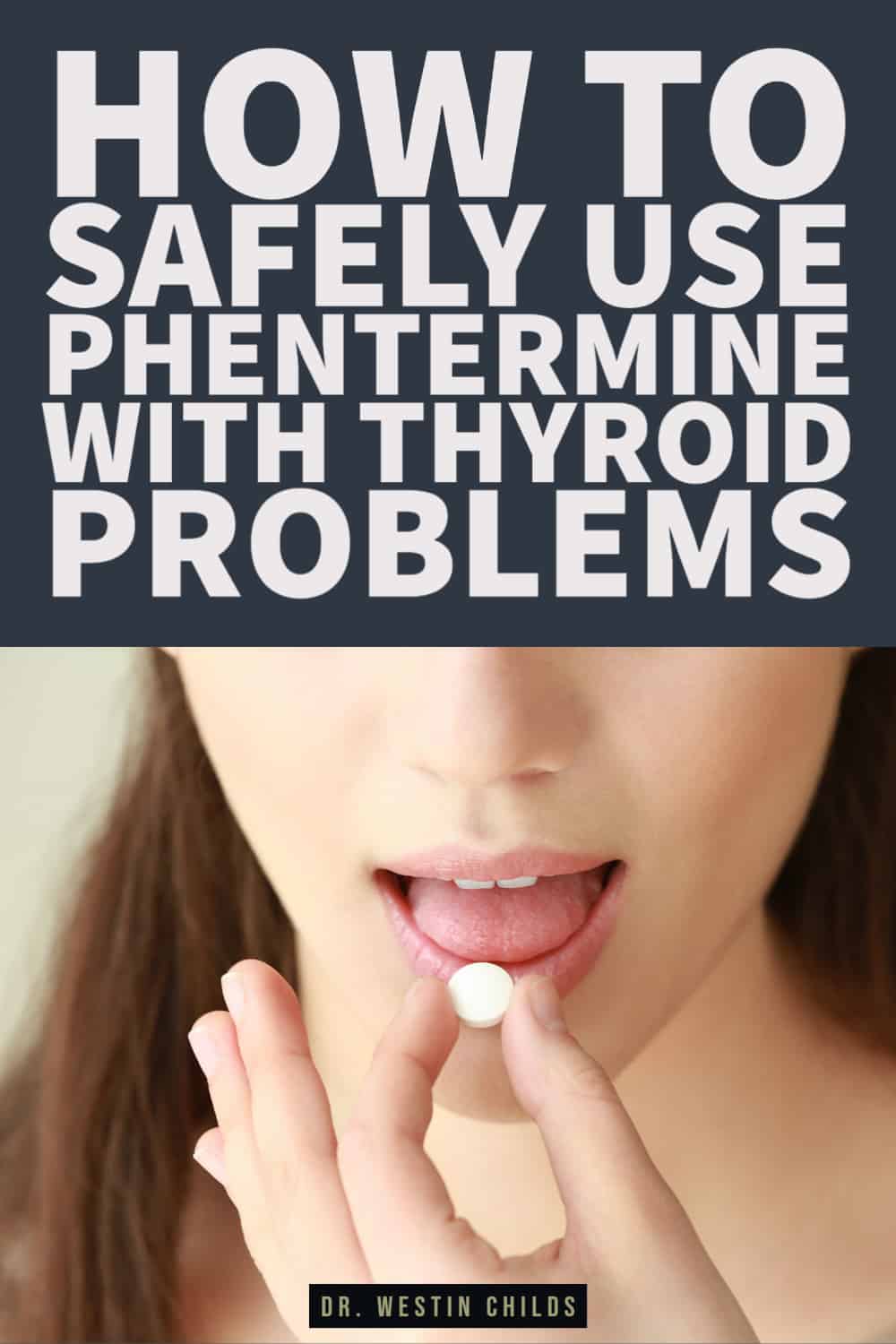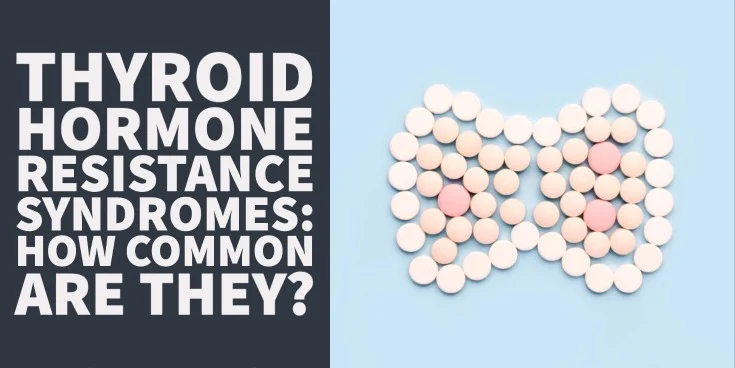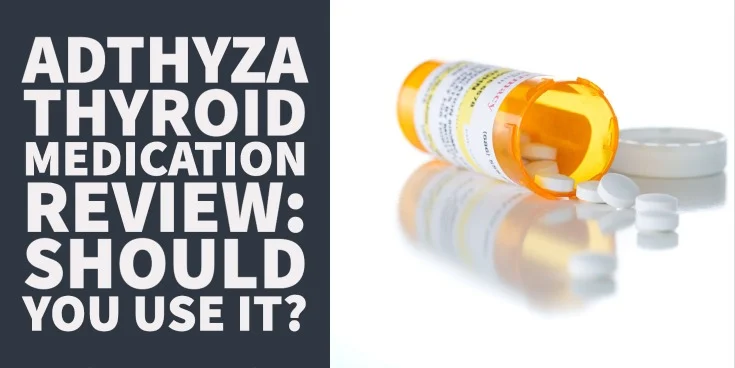So you have a thyroid problem and you’re looking for prescription medications that can help.
If so, chances are high that you will run across phentermine.
Phentermine is one of the most commonly prescribed medications used to help patients lose weight.
There’s one big problem though:
While it can be effective, it has the potential to cause certain problems for thyroid patients (those with hypothyroidism, Hashimoto’s, thyroidectomy, and RAI).
If these conditions are untreated and you take phentermine you may be putting unneeded stress on your adrenals and thyroid which can make you feel worse.
But, if you use this medication correctly, you can get the results you are looking for.
It’s certainly not a miracle drug that will result in dramatic weight loss, but it can be helpful for a variety of reasons and is still worth considering in certain situations.
With that in mind, let’s talk about how to use phentermine safely if you have a thyroid problem:
How Does Phentermine Work?
First of all, let’s set some ground rules.
Even though medications can help you with weight loss, they should never be used by themselves.
Weight loss medications, no matter how powerful they are, will never eliminate the need to eat healthily and exercise regularly.
I don’t recommend using weight loss drugs by themselves to try and force your body to lose weight because this tends to cause more problems than it helps.
If you will recall from my previous posts, losing weight and keeping it off requires that your hormones are in balance.
In this way, weight loss is more than just a calorie equation, it’s a hormone-balancing game as well.
If you are still of the opinion that weight loss is all about calorie reduction then stop reading right now and read this post instead.
Now that we are all on the same page we can move on.
Is this the first time you’ve heard of phentermine before?
If so, let me fill you in on some basics.
Phentermine is a prescription medication frequently used for weight loss and it works through these two mechanisms:
- The first is that it increases your basal metabolic rate (increasing your metabolism helps you burn more calories at rest)
- And the second is that it reduces your appetite (managing your appetite helps you eat less junk food and stay on your healthy diet, you are planning on eating a healthy diet when you use it, right?)
If you are coming from the mindset that calories are the most important thing when it comes to weight loss then this will sound great to you.
But you can’t forget the importance that hormones play in the weight loss equation.
And it is the impact that phentermine may have on your hormones that can lead to problems down the road (more on that later).
Phentermine acts to increase your metabolism by increasing the amount of norepinephrine (adrenaline) in your body (1).
Norepinephrine is an adrenal hormone and it’s also known as noradrenaline.
This hormone is responsible for providing you with that get-up-and-go energy that you need when you are in the fight-or-flight response.
Stimulating the fight or flight response also comes with some other side effects such as a reduction in appetite.
And this makes sense if you think about it.
When you are about to fight for your life (or run for your life, as the case may be), would you really want your body to start having a craving for a meal?
Not exactly.
As a result of impacting this system, taking phentermine may cause patients to feel more energy, increase their basal metabolism, and reduce their appetite.
Sounds pretty good, right?
Not so fast!
This is how it works in patients without a thyroid problem.
But if you are someone with a thyroid problem then there are a few other things you need to consider.
DOWNLOAD FREE RESOURCES
Foods to Avoid if you Have Thyroid Problems:
I’ve found that these 10 foods cause the most problems for thyroid patients. Learn which foods you should avoid if you have thyroid disease of any type.
The Complete List of Thyroid Lab tests:
The list includes optimal ranges, normal ranges, and the complete list of tests you need to diagnose and manage thyroid disease correctly!
Phentermine Impacts Your Thyroid And Adrenal Glands
As you know, your thyroid (in conjunction with your adrenal glands) regulates the metabolism of your body.
Patients with hypothyroidism usually have a lower-than-normal metabolism (2) (sometimes as much as 30-40% below normal).
Because of the negative impact that low thyroid states have on metabolism, thyroid patients are already at a disadvantage when it comes to losing eight.
After all, losing weight with a slower-than-normal metabolism is like entering a boxing match with one hand tied behind your back.
Not something I would recommend.
At first glance, you may think that adding phentermine, which increases metabolism, would be a good idea.
Unfortunately, it isn’t that easy.
Taking phentermine when your thyroid is untreated puts excess strain on your adrenals which can ultimately make thyroid function worse.
Remember that your thyroid gland and adrenals function as one unit (3)!
If something drags down your adrenals it will also drag down your thyroid.
So putting extra stress on this system, especially if it is already impaired, is not a good idea for most thyroid patients.
This doesn’t mean you can’t use it, it just means you need to be cautious when you do.
You can take steps like pre-treating your adrenals (or treating them as you take phentermine) and ensuring that your thyroid medication dose is optimized before you start taking it.
Doing these two things will put you on equal footing with those people who don’t have a thyroid problem and will help the medication be more effective.
In some cases, especially in those with severe fatigue, it may make sense to support your thyroid for 4-8 weeks before you start taking phentermine just to ensure you don’t cause more harm than good to your adrenal glands.
To see if your physiology can handle phentermine answer these questions:
Can Your Thyroid Handle Phentermine?
- Is your basal body temperature < 97.8? – A low basal body temperature indicates that your thyroid dose is not optimized.
- Are you taking T4-only medication like Synthroid or levothyroxine? – Many thyroid patients taking T4-only medications are underdosed.
- Have you had a complete thyroid lab panel and are your thyroid lab tests optimized? – If your thyroid lab tests are not optimal then you know that your thyroid function is not optimized.
- Do you still have hypothyroid symptoms? – If you are experiencing persistent low thyroid symptoms while taking thyroid medication then you know your thyroid isn’t optimized.
- Do you have palpitations or feel like your heart is racing? – Symptoms like a racing heart or heart palpitations may indicate your thyroid medication is too high.
If you answered Yes to any of these questions then it would not be a good idea to take phentermine until they are addressed!
In many cases, slight adjustments to your thyroid medication dose will probably be necessary.
You might also find that changing to a completely different thyroid medication, one that contains T3, may be necessary as well to optimize your thyroid.
Alternatively, you can also try to optimize your thyroid the all-natural way but note that this process will take time.
Can Your Adrenals Handle Phentermine?
In addition to your thyroid function, you also need to make sure that your adrenals can handle the extra stress put on them by phentermine.
You can do a quick and dirty adrenal health test by asking yourself the following questions:
- Are you dependent upon taking adrenal supplements like adrenal adaptogens or adrenal glandulars for energy?
- Do you have any of the symptoms of adrenal fatigue like feeling wired but tired, salt and sugar cravings, a 2 pm crash, decreased sleep, weight gain, and the inability to tolerate stress?
- Are you dependent upon caffeine to get up and go?
- Are you taking hydrocortisone or other steroids to support your adrenal health?
If you answered yes to any of these questions then you may want to pre-treat your adrenals prior to using phentermine.
You can do this by taking certain adrenal support supplements, eliminating stressors in your life, eating a healthy diet, taking advantage of low-intensity exercises at night, carbohydrate cycling, and using meditation.
Optimizing your adrenal glands for 1-2 months prior to using phentermine may be ideal for many thyroid patients.
How I Recommend Using Phentermine
Once you’ve confirmed that your thyroid and adrenal glands can handle phentermine, the next thing you need to do is make sure you are using it correctly.
As I said before, phentermine by itself doesn’t actually balance your hormones or lead to lasting weight loss.
But it does have some interesting side effects that we can exploit to make balancing your hormones easier.
We can do that in a couple of ways:
- By augmenting treatments designed to reverse leptin resistance
- By augmenting treatments designed to lower insulin resistance
- Use it in conjunction with fasting protocols such as intermittent and prolonged fasting
Using phentermine in this way allows you to take advantage of one of its primary side effects which is appetite suppression.
This side effect can be very helpful in patients who suffer from intense food cravings (like those with leptin resistance) or in patients who need to be on fasting protocols because of insulin resistance.
As you may know, the key to reversing insulin resistance is reducing insulin levels, and there is no better way than fasting.

One way to take advantage of this benefit without causing more problems with your hormones is to only take it when you are fasting.
Using it in this way allows for easier fasting days and doesn’t put you at risk of consistent calorie restriction which may cause problems with reverse T3.
Do you see the difference between using this medication by itself for weight loss and using this drug to balance other hormones for weight loss?
There is a big difference!
How Not to Use Phentermine
Unfortunately, the wrong way to use phentermine is the most common way that it is used.
Most people believe that taking the medication will reduce their appetite which means they won’t eat as much which means they will lose weight.
Remember that this does not lead to long-lasting weight loss and about 98% of people who try this type of diet ultimately end up gaining the weight back (4).
The biggest mistake you can make is using phentermine to reduce your calories for a prolonged period of time while still eating poor-quality foods, just less of them.
This method of use will result in further thyroid damage (5) and weight gain once you stop the medication.
Beware of this trap!
The traditional advice is to take phentermine daily for several months and then give yourself a holiday.
This holiday is supposed to give your body a break and resensitize it to the medication.
I’ve seen far better results when phentermine is used just a few days each week instead of 7 days per week.
This method comes with built-in drug holidays (breaks from the medication) and doesn’t cause the same hormone and thyroid problems that consistent daily use does.
If you are determined to take it daily for a long period of time make sure that you use it at most 5 days out of the week and take a 1-month break every 2 months or so.
Doing this will allow your receptors to re-sensitize to the medication and keep it working for you longer.
Side Effects to Watch Out For
Even though phentermine can be beneficial does not mean that it will be for every individual.
In my experience up to 15-20% of patients don’t tolerate it well due to a variety of side effects.
The most common side effects that I see in patients include the following:
- Insomnia – This is a big one, do not take this medication if it keeps you from sleeping. A lack of sleep leads to weight gain (6)!
- Worsening Fatigue – This is what happens when you take it without treating your adrenals or thyroid first.
- Fatigue in the morning with bursts of energy at night – Another sign that your adrenals are not ready for this medication.
- Irritability
- Dry mouth
- Palpitations or racing heart
- Hair loss
- Decreased libido
Phentermine can cause additional symptoms that are rarer including (7):
- Chest pain
- Mental changes
- Dizziness
- Tremors or trembling of the extremities
- Shortness of breath
- Weakness
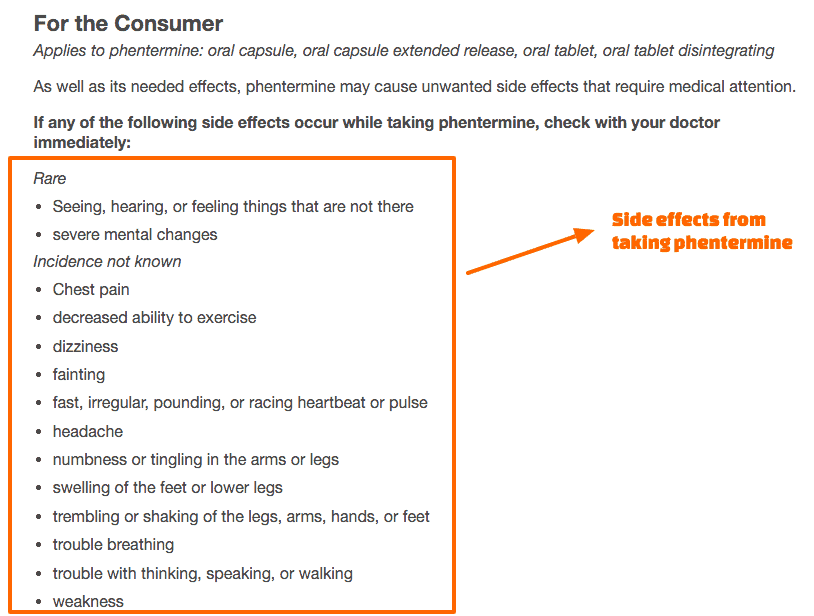
If you experience these side effects you can try reducing the dose by half, or even taking the medication every other day (or only on fasting days).
But don’t continue taking it if your symptoms don’t resolve with these changes.
It’s not worth impairing other systems in your body to lose a couple of pounds.
Don’t take Phentermine Without Taking These Supplements
If you currently have hypothyroidism or Hashimoto’s and you are considering taking phentermine, it’s a good idea to take a few supplements with it.
Here are a few of my favorites and why they should be considered:
- Adrenal support with a combination of adrenal glandulars and adrenal adaptogens – This supplement was designed just for thyroid patients to help support the adrenal-thyroid connection.
- Glucomannan powder – Glucomannan is a dietary fiber that expands when introduced to water. It’s another helpful supplement that you can use to safely manage your appetite.
- Berberine – Berberine is a plant-based compound that has been shown to assist in building muscle mass and lower blood sugar.
- Glycosaminoglycans – Glycosaminoglycans may help sensitize your body to leptin while also reducing inflammation.
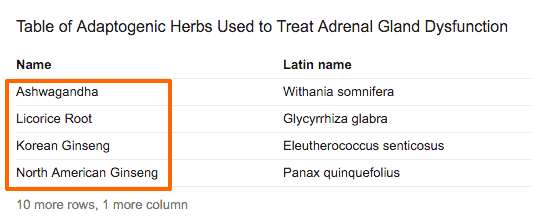
Combining these supplements with proper thyroid medications (like Naturethroid or liothyronine) balances both your cortisol and thyroid levels.
You can (and probably should) take it a step further by adding in regular exercise and a fasting protocol.
Combining all of these treatments together will put your body in a position to burn fat and build muscle while ensuring that your thyroid and adrenal glands stay happy!
Wrapping it up
Phentermine isn’t a magical medication that will help every patient lose weight but it definitely has the potential to help some when it is used correctly.
My favorite side effect of this medication is appetite suppression which can be used in conjunction with fasting to reverse insulin resistance and leptin resistance which both plague thyroid patients.
Even though it can be helpful in some people it can also cause more harm than good in others, especially if it’s used in patients who are being undertreated for their thyroid or in patients with untreated adrenal fatigue.
Now it’s your turn:
Have you used phentermine before?
Did you feel that it helped you or hurt you?
Did you try taking it in the way mentioned above or did you use the conventional method?
Did it work for you long-term or did you eventually regain back the weight you lost while you were on it?
Would you recommend it to other thyroid patients?
Leave your questions or comments below!
Scientific References
#1. http://www.ncbi.nlm.nih.gov/pubmed/10789886
#2. http://www.ncbi.nlm.nih.gov/pubmed/12055988
#3. http://www.ncbi.nlm.nih.gov/pmc/articles/PMC3520819/
#4. http://www.ncbi.nlm.nih.gov/pubmed/12076496
#5. http://www.ncbi.nlm.nih.gov/pubmed/14666786
#6. http://www.ncbi.nlm.nih.gov/pmc/articles/PMC2831987/
#7. http://www.drugs.com/sfx/phentermine-side-effects.html
